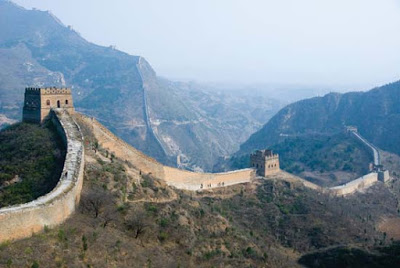Summary: China will make its mainland bond market more accessible. As China’s portfolio of patents grows it will likely become more protective of others’ intellectual property rights. PRC President Xi will likely visit US President Trump early next month. The market’s immediate focus is on today’s FOMC meeting and Dutch elections. However, China’s annual legislative session (National People’s Congress) ended earlier today, and Premier Li unveiled a new initiative. Late this year, China will allow overseas funds to buy onshore bonds in Hong Kong. Details on the mechanics, including implementation timeframe, were not immediately available, but the general thrust is consistent with other measures to boost market accessibility and encourage inflows. The State Administration of Foreign Exchange (SAFE) announced at the end of last month that foreign institutions that invest in interbank debt market could trade a range of financial products, including forwards, swaps, and options mainland counterparties. The Shanghai and Shenzhen links to Hong Kong allow accounts in the Special Administrative Region to have access to mainland shares. Trying to convince MSCI to include mainland shares in the emerging market indices, China eased access (to the A shares).
Topics:
Marc Chandler considers the following as important: bonds, China, Featured, FX Trends, newslettersent, US, Yuan
This could be interesting, too:
Nachrichten Ticker - www.finanzen.ch writes Die Performance der Kryptowährungen in KW 9: Das hat sich bei Bitcoin, Ether & Co. getan
Nachrichten Ticker - www.finanzen.ch writes Wer verbirgt sich hinter der Ethereum-Technologie?
Marc Chandler writes March 2025 Monthly
Mark Thornton writes Is Amazon a Union-Busting Leviathan?
Summary:
China will make its mainland bond market more accessible.
As China’s portfolio of patents grows it will likely become more protective of others’ intellectual property rights.
PRC President Xi will likely visit US President Trump early next month.
 The market’s immediate focus is on today’s FOMC meeting and Dutch elections. However, China’s annual legislative session (National People’s Congress) ended earlier today, and Premier Li unveiled a new initiative. Late this year, China will allow overseas funds to buy onshore bonds in Hong Kong.
The market’s immediate focus is on today’s FOMC meeting and Dutch elections. However, China’s annual legislative session (National People’s Congress) ended earlier today, and Premier Li unveiled a new initiative. Late this year, China will allow overseas funds to buy onshore bonds in Hong Kong.
Details on the mechanics, including implementation timeframe, were not immediately available, but the general thrust is consistent with other measures to boost market accessibility and encourage inflows. The State Administration of Foreign Exchange (SAFE) announced at the end of last month that foreign institutions that invest in interbank debt market could trade a range of financial products, including forwards, swaps, and options mainland counterparties.
The Shanghai and Shenzhen links to Hong Kong allow accounts in the Special Administrative Region to have access to mainland shares. Trying to convince MSCI to include mainland shares in the emerging market indices, China eased access (to the A shares). However, increasing access to the mainland bond market is also important, and arguably, increasingly so now that the yuan is part of the SDR. Both Hong Kong and China are developing a bond trading platform.
When the yuan was trending higher and capital inflows, Chinese officials liberalized outflows. Now, in a different part of the cycle, China is seeking to liberalize inflows. It is working with the market to guide it. Foreign investment in China’s onshore bond market estimated around $100 bln. Some bond market indices, which are used by some asset managers as a benchmark, have recently begun including onshore bonds. According to Moody’s sovereign bonds and policy, bank bonds account together for about 37% of the China’s $9.5 trillion interbank bond market. The rating agency expects the inclusion of China’s onshore bonds in the benchmark indices will encourage additional passive inflows.
In addition to the opening up of the onshore bonds market, China is arguably on the verge of another important step. China is often criticized by some high income countries for violations of intellectual property rights. We have argued that this is more a function of the level of development than moral shortcomings. In the 19th century, for example, a rising developing country and revisionist power, the United States often treated European intellectual property rights in a similar fashion. As China developed its own portfolio of patents and intellectual property, we anticipate China to be more respectful of others’ intellectual property.
The World Intellectual Property Organization (UN) reported that China’s international patent applications rose 45% last year. By the end of the decade, China can surpass the US and Japan to be the largest user of the international patent system. Two Chinese companies topped the 2016 league table for international patent applications: Zte (telecoms) and Huawei (electronics). The US Qualcomm was in the third place, and Japan’s Mitsubishi Electric was in fourth place. Asia accounted for nearly half of the international patent applications in 2016 and the US and Europe almost evenly divided the other half.
This weekend, while the G20 are meeting in Germany, US Secretary of State Tillerson is expected to meet China President Xi and Premier Li. The meeting should pave the path that will lead to the first summit between Trump and Xi in early April. As we have noted, Trump has walked back from some of the more antagonizing rhetoric, like the threat to abandon the one China policy or to cite China as a currency manipulator. While there are several Trump Administration officials and advisers that are particularly antagonistic to China. However, as we have noted, there are others who accept the general framework the global liberal world order the US has helped facilitate. Chinese officials, being politically savvy, are likely to encourage the latter. Although some of Trump’s supporters may not like it, don’t be surprised if China is not cited as a manipulator in next month’s Treasury report.
Tags: Bonds,China,Featured,newslettersent,US,yuan
